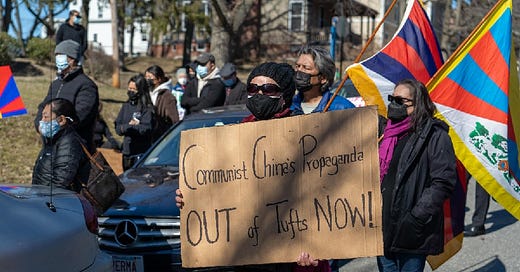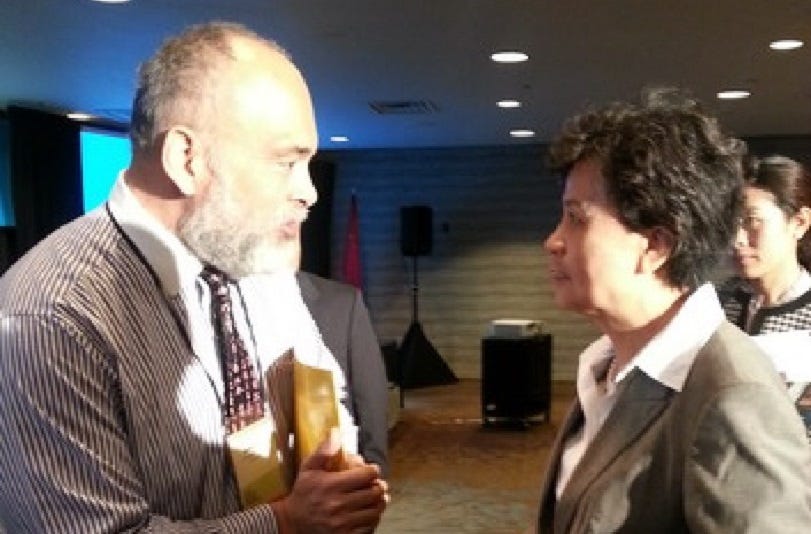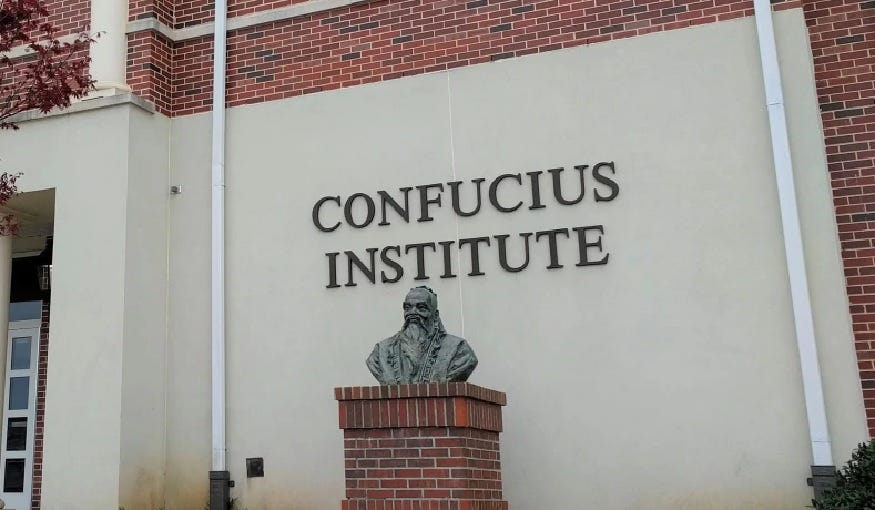An unholy alliance continues between the Chinese Communist Party and American universities
A communist country committing genocide continues to choose the professors employed at American universities with near impunity.
Students across all political and ethnic spectrums have taken to their campuses to demand their schools end agreements with the communist Chinese Confucius Institutes. After this protest last fall, Tufts University terminated its contract the Hanban, the Chinese agency sponsoring the programs. (Photo: Thomas Voorhies/Boston Globe) _______________________________________________________________________________________________________________
American universities across the country are being subverted by the Chinese Communist Party. It is yet another insidious effort by the CCP to spread its repressive, evil influence worldwide. Further, the agreements that allow China to control multiple aspects of education at those institutions are unconstitutional.
It is well understood the CCP is America’s greatest long-term threat, so we must defend against China’s broad-scale aggression against America. The challenge ahead is for every American ― and every state government ― to play a role in fighting back.
For several decades, China has waged a non-violent war against the United States. The tactics don’t reflect war as it is understood traditionally, but the CCP is committed to infiltrating the West by any means necessary. The most infamous aspect of this effort is China’s centrally planned and executed stealing of massive amounts of American intellectual property. Even FBI Director Christopher Wray has repeatedly noted China’s theft has been “on a scale so massive that it represents one of the largest transfers of wealth in human history.”
They have also established major influence in corporations, Hollywood, and sports leagues ― all of which have capitulated to China's communist regime.
Disney faced backlash for filming a movie in the Xinjiang region, where China has enslaved an entire ethnic group, the Uyghurs. These ethnic Turks who follow Islam areused for slave labor, killed so their organs can be harvested for transplants done around the world. and their women are believed to be used as sex slaves for the People’s Republican Army.
When one NBA team owner had the temerity to publicly support the peaceful protesters in Hong Kong, the league was confronted by its largest revenue source: China. Pathetically, the NBA folded to the tyrants rather than standing for freedom. Instead of expressing support for those seeking freedom in Hong Kong, the NBA caved to the communist regime.
China will use its economic power to achieve its evil political goals of remaking the world in its own authoritarian image, but it does not end there. The regime is also seeking to influence American educational institutions by indoctrinating future generations.
The communists have extended their influence by entering into agreements with American universities to have control over the teaching and presentation of the Chinese language and culture. As of January 18, there were 24 U.S. universities in agreements to establish what the Chinese call Confucius Institutes on those campuses.
The Confucius Insttitue at the University of Toledo is one of those still open. The UT department chair, James Gibson, met with Xu Lin, Chief Executive of the Confucius Institute Headquarters and Director-General of Hanban in 2013. Xu continues to travel regularly to the U.S. to keep an eye on the institutes that remain in operation. (Photo: Angeline Davis/Toledo Blade) ______________________________________________________________________________________________________________
The other party to each of these agreements is a university or institution in China that is part of the Communist Chinese Party’s tyrannical government. These agreements are effectively between an agency of the 24 schools in 13 states and the communist government of China. That number is significantly reduced from the high of over 100. Since Congress passed legislation in April last year forbidding schools that accept defense department funding from entering into the Confucius Institute agreements, with all but the remaining two dozen entities having closed.
The fact these remaining 24 schools continue to sponsor a Chinese propaganda machine presents a question about communist influence, but it also violates the U.S. Constitution. Article I, Section 10 says: “No State shall, without the consent of Congress … enter into any Agreement or Compact with another State, or with a foreign Power.”
Many have hailed the closing of three-quarters of the institutes that were in operation three years ago in the U.S., but the cause for celebration should be given an evaluttion. While 79 of the Confucius Institutes have closed, Communist China has been engaged in a rebranding of the concept since a worldwide backlash.
Confucius Institutes carry the stated purpose of promoting Chinese language and culture. However, U.S. officials have singled out the institutes as propaganda centers that serve as an extension of China’s “soft power.”
The Confucius Institute Headquarters in Beijing has changed its name to the “Ministry of Education Centre for Language Education and Cooperation.” Additionally, the organization changed the name of its account on Chinese social-media app WeChat, although it is not clear if Confucius Institutes in other countries will themselves be renamed.
The name change is “related to various kinds of pressure, but it is by no means succumbing to them,” Sun Yixue, a professor at the International School of Tongji University in Shanghai, told the South China Morning Post. “It is a timely adjustment made by China to adapt to the new situation of world language and cultural exchanges, but this does not mean that all overseas Confucius Institutes should be renamed accordingly.”
The agreements between these universities and the communist government of China violates the U.S. Constitution because they are agreements between a state and a foreign power, and there is no congressional approval for these arrangements. The agreements are not just for the exchange of students. Rather, they allow China control over the most important element of sovereignty within a university setting, namely, the power to select instructors employed in those institutes.
In addition to being unconstitutional, these agreements facilitate China’s long-term strategic goals of painting itself in a falsely positive light in the United States. China has been determined by our own government to be forcibly interning millions of the Uyghurs, who are China’s own citizens in Xinjiang province, because they refuse to become atheists and because of their cultural differences with the rest of China.
Unfortunately, the U.S. is not the only nation being victimized by this treacherous CCP plot. Founded in 2004, the Confucius Institutes ― or whatever name they may soon operate under ― are a global phenomenon, at one point enrolling more than nine million students at 525 institutes in 146 countries and regions. As in the U.S., about 75 poercent of them have closed, though China is attempting to reinsert itself in the academic communities that have kicked the CCP institutes to the curb.
These are not small colleges and universities that have entered into these agreements. Some of the most prestigious universities in the U.S. have eagerly taken what amounts to Chinese bribery to spread propaganda, including Columbia and Stanford. They are mostly staffed and funded by an agency of the Chinese government’s Ministry of Education ― the Office of Chinese Languages Council International, or Hanban.
What is even more frightening is that The Hanban also operates Confucius Classrooms in an estimated 47 primary and secondary schools in the United States. That number is also greatly reduced, having numbered over 500 two years ago.
Following a scathing report on what happens inside them, man Confucius Institutes across the U.S., like this on at Troy University in Alabama, have closed. China, however, continues to attempt to influence American academic thought at U.S. institutions of higher education. (Photo: Troy University Public Information Office) _______________________________________________________________________________________________________________
A 243-page National Association of Scholars report issued in 2017 warned of the many strings attached to the goodies offered by Confucius Institutes:
Intellectual freedom. Chinese teachers—hired, paid by and accountable to the Communist Chinese government—are pressured to avoid “sensitive” topics like the Tiananmen Square Massacre and the Cultural Revolution.
Transparency. Contracts between American universities and the Hanban are rarely made public. One university went so far as to forbid Rachelle Peterson from visiting their campus as part of her research.
Entanglement. Confucius Institutes cover all the expenses of classes and also offer scholarships to American students to study abroad. With such financial incentives, universities find it difficult to criticize Chinese policies like its genocidal treatment of Muslim Uyghurs in Western China.
Soft power. Confucius Institutes avoid discussing China’s widespread human-rights abuses and present Taiwan and Tibet as undisputed Chinese territories. As a result, writes Peterson, the institutes “develop a generation of American students with selective knowledge of a major country”—and a major adversary. Confucius Institutes are a textbook example of soft power that causes universities in receipt of Chinese largesse to stay silent about controversial subjects like China’s use of forced labor to pick cotton, a 21st century variation of the slavery of the ante-bellum South.
The institutes pretend to be a Chinese version of cultural institutions like the Alliance Française or the Goethe Institute, but they are in reality a propaganda machine funded and directed by the Chinese government. Based on the findings of its 2017 report, the NAS recommended that “all universities close their Confucius Institutes.”
Writing in the New Republic — the leading journal of the Left — Isaac Stone Fish said he had found on many American campuses “a worrying prevalence of self-censorship regarding China.” Some of America’s most distinguished schools kowtowed to Communist China, including Columbia University’s Global Center in Beijing, which cancelled talks “it feared would upset Chinese officials.” North Carolina State University canceled a visit by the Dalai Lama, Tibet’s revered religious leader. The university’s pragmatic provost explained his decision with the revealing statement that, “China is a major trading partner for North Carolina.”
Academic self-censorship has an impact far beyond the ivy tower, Fish explained. It restricts the ability of U.S. policymakers, business leaders, human-rights advocates, and the general public to make the right decisions about how to interact with China. For the Hanban, the correct decision is one that acknowledges China’s rightful place as the Middle Kingdom of Asia and a global superpower as important as the United States.
Claremont McKenna professor of government Minxin Pei has been one of the leading critics urging the U.S. force the closure of the Confucius Institutes or any other similar effort at spreading propaganda being taught at American universities. (Photo: Claremont-McKenna College Public Information Office) _______________________________________________________________________________________________________________
Leading American universities are not immune to China’s hard-edged soft power. Minxin Pei, a professor of government at Claremont McKenna College and an open critic of China’s authoritarian government, refers to the American institutions that have programs in China as “hostages.” “If you’re Stanford or Harvard and you have operations in China,” Pei asks, “are you going to host a famous dissident?”
If schools in the U.S. are unwilling to offend China by hosting dissidents on their campuses, Pei said, it is highly unlikely they will risk offending China on its own soil.
The question of self-censorship is a proxy for the critical question of how to react to the global rise of China. Should the U.S. protest it? Accede to it? Try to stop it? Regardless of the reservations of liberal U.S. academics about American global dominance, he says, “many China studies professors have spent enough time in China to conclude they don’t want to live in China’s world.” American academics should think critically, he says, about “how to respond to China’s growing influence instead of acting as [President Jinping] Xi’s willing censors.”
Yet these Confucius Institute agreements are allowed to stand, with few if any constitutional challenges. A communist country committing genocide continues to choose the professors employed at American universities with impunity.
FBI Director Wray has said: “The Chinese government is engaged in a broad, diverse campaign of theft and malign influence, and it can execute that campaign with authoritarian efficiency. … They’re calculating. They’re persistent. They’re patient. And they’re not subject to the righteous constraints of an open, democratic society or the rule of law.”
There are actions that everyday Americans can take to fight back and speak out. But this issue of influence on our college campuses requires leadership different from those elected in in Washington, D.C. and several state capitols across the U.S.
Elected officials need to take all necessary steps ― immediately ― to terminate these unconstitutional agreements that only serve to advance the Chinese Communist Party’s agenda in our own backyard, in the institutions of higher education that have long since ceased to be trustworthy with the minds of our next generations.
Mike Nichols is an advocate of the counterrevolution with a four-step plan to defeat Leftist Fascism: We Organize. We Stand. We Resist. We Fight. He is a regular contributor to several conservative news websites and has a regular blog and Facebook presence at Americas Conservative Voice-Facebook.








